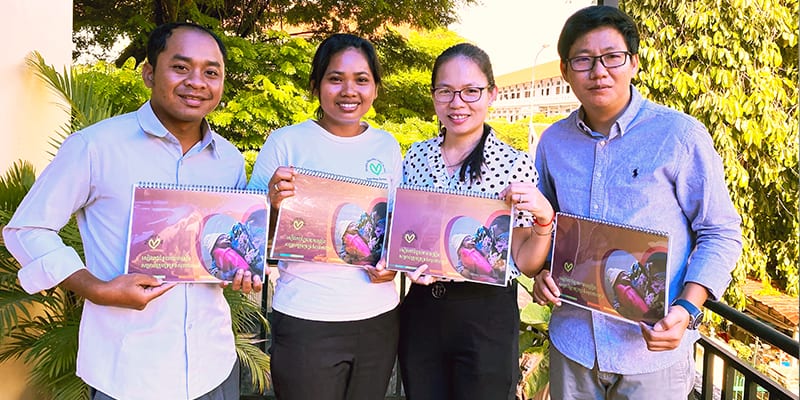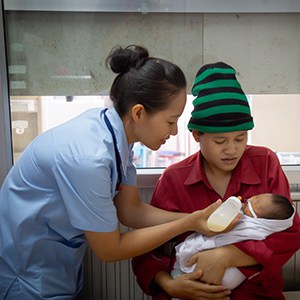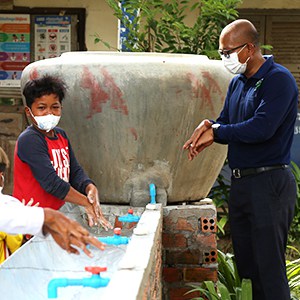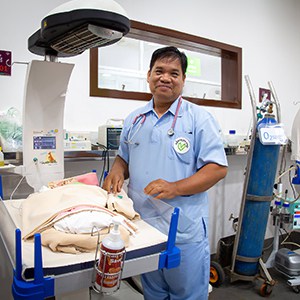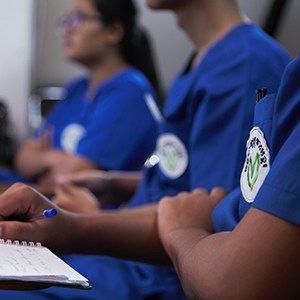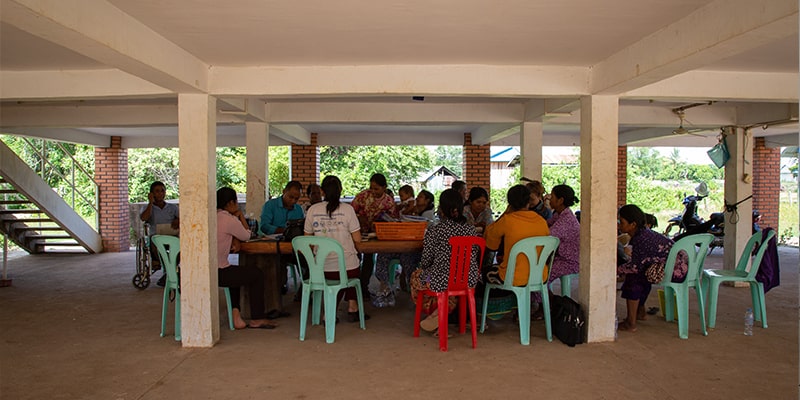In Preal Village, Rovieng District, Preah Vihear Province, a farmer named Sak is one of two Village Health Support Group (VHSG) volunteers assigned to the community. Sak has been a VHSG for over 26 years, and has been participating in Participatory Action Research (PAR), as part of the community component of AHC’s Saving Babies Lives (SBL) programme, since its initiation.
VHSGs are government endorsed primary health volunteers that provide healthcare information and support in their community. Since SBL began implementing the PAR methodology in Preah Vihear Province, VHSGs have identified problems and concerns around neonatal healthcare and worked to develop, implement, and evaluate the effectiveness of interventions in their respective villages.
Sak was making his weekly rounds in his village and heard about Nika, a 25-year-old farmer who recently gave birth to her third child, a boy named Sophal, at Doun Ma Health Post. Although her newborn was born healthy and full term, weighing three kilos, at 15 days old Nika noticed an issue with Sophal’s skin and took him to a traditional healer. In areas where health literacy is low, including Preah Vihear, young mothers like Nika are not aware of the health resources that are available to them and their babies and often revert to traditional healers for support.
In Cambodia, traditional healers practice a combination of herbal remedies and rituals based on localised superstitions. Their methods stem from ancient times and the more recent civil war, and families, especially in rural areas, still depend on them today. One of PAR’s monthly topics includes teaching the importance of going to a health facility instead of a traditional healer, as their treatments are actually sometimes more harmful than good, especially for newborns. Newborns are especially vulnerable and can deteriorate rapidly so going to traditional healers can waste precious time that they often do not have.
“The VHSGs play an important role in primary healthcare for their village, and so to improve the primary healthcare we need to strengthen their capacity. From our many discussions with VHSGs, one of the main things they ask us is for support with is how to change the behaviour of villagers about using traditional practice, because they know many traditional practices are still going on for mothers and babies in Preah Vihear. They know that practices like hotbed, spitting, and food restriction can harm the baby and can delay them in receiving the care and treatment the babies actually need.”
Leng Daly, SBL Community Lead
Feeling very concerned, Sak went to visit Nika’s home and immediately recognised that Sophal was suffering from blisters, a dangerous sign of infection. Often in rural areas, lack of hygiene and hotbed-use are the main causes of blisters on neonates. If not properly treated, blisters can lead to life-threatening neonatal infections. Sak used his SBL flipchart to explain to Nika what blisters are and why Sophal needed to get medical treatment with immediate urgency. The SBL flipchart is a teaching aid that the SBL programme recently developed so that VHSGs can educate villagers once a month based on the training they received through PAR health education sessions provided by the SBL team. Currently no such tool to support VHSGs to teach neonatal topics to villagers exists in Cambodia and this resource will be an important output of the SBL programme, which will be shared with the Ministry of Health for consideration of uptake and use across the country.
“I also used to believe that if a newborn has a blister, they need to go to a traditional healer. After joining PAR sessions many times with SBL team, I know blisters means infection and is a danger sign for a baby’s health”
Sak, Preah Vihear VHSG
After Sak’s visit and recommendation, Nika took Sophal to their closest health facility, Preah Vihear Referral Hospital. Preah Vihear Referral Hospital was the first hospital for the SBL team to train and mentor medical staff and set up the first Neonatal Care Unit (NCU) in the province. The doctors and nurses, who have been receiving training from the SBL team for over two years, admitted Sophal to the NCU and successfully treated him with intravenous antibiotics. Fortunately, Sophal was successfully cured and discharged after seven days, thanks to Sak’s timely intervention.
